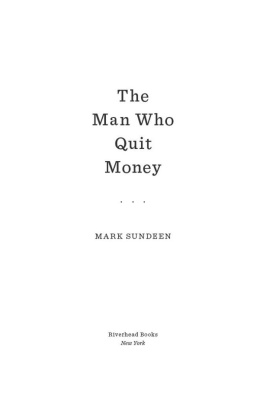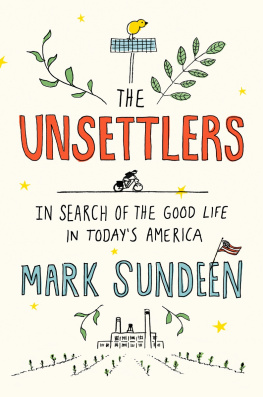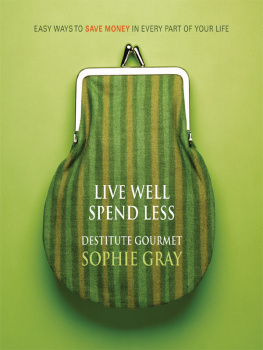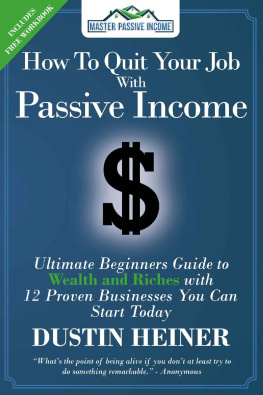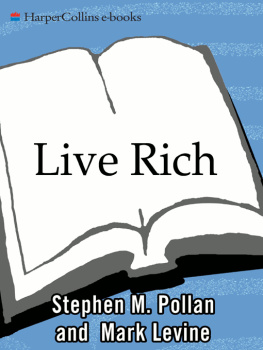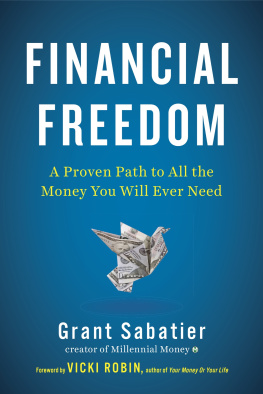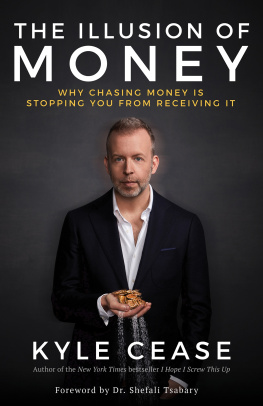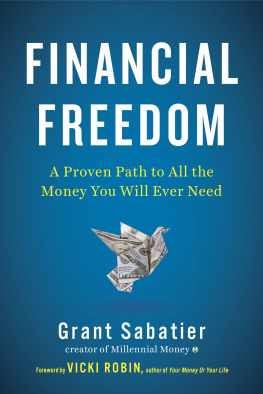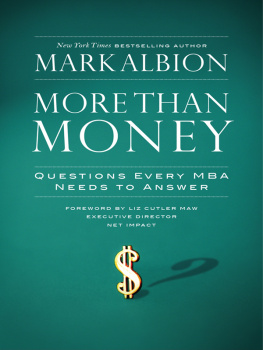The
Man Who
Quit
Money
Also By Mark Sundeen
Car Camping
The Making of Toro
North by Northwestern
(with Captain Sig Hansen)
The
Man Who
Quit
Money
...
MARK SUNDEEN
Riverhead Books
New York
RIVERHEAD BOOKS
Published by the Penguin Group
Penguin Group (USA) Inc.
375 Hudson Street, New York, New York 10014, USA
Penguin Group (Canada), 90 Eglinton Avenue East, Suite 700, Toronto, Ontario M4P 2Y3, Canada
(a division of Pearson Penguin Canada Inc.)
Penguin Books Ltd., 80 Strand, London WC2R 0RL, England
Penguin Group Ireland, 25 St. Stephens Green, Dublin 2, Ireland (a division of Penguin Books Ltd.)
Penguin Group (Australia), 250 Camberwell Road, Camberwell, Victoria 3124, Australia
(a division of Pearson Australia Group Pty. Ltd.)
Penguin Books India Pvt. Ltd., 11 Community Centre, Panchsheel Park, New Delhi110 017,
India
Penguin Group (NZ), 67 Apollo Drive, Rosedale, Auckland 0632, New Zealand
(a division of Pearson New Zealand Ltd.)
Penguin Books (South Africa) (Pty.) Ltd., 24 Sturdee Avenue, Rosebank, Johannesburg 2196,
South Africa
Penguin Books Ltd., Registered Offices: 80 Strand, London WC2R 0RL, England
The publisher does not have any control over and does not assume any responsibility for author or third-party websites or their content.
Copyright 2012 by Mark Sundeen
Book design by Tiffany Estreicher
All rights reserved.
No part of this book may be reproduced, scanned, or distributed in any printed or electronic form without permission. Please do not participate in or encourage piracy of copyrighted materials in violation of the authors rights. Purchase only authorized editions.
RIVERHEAD is a registered trademark of Penguin Group (USA) Inc.
The RIVERHEAD logo is a trademark of Penguin Group (USA) Inc.
First Riverhead trade paperback edition: March 2012
Library of Congress Cataloging-in-Publication Data
Sundeen, Mark, date.
The man who quit money / Mark Sundeen.
p. cm.
ISBN: 978-1-101-56085-3
1. Suelo, Daniel. 2. Self-reliant living United States. 3. Alternative lifestylesUnited
States. 4. MoneySocial aspects. 5. Simplicity. I. Title.
CT275.S87445S86 2011
332.49792092dc23
[B]
2011049882
PRINTED IN THE UNITED STATES OF AMERICA
10 9 8 7 6 5 4 3 2 1
For Cedar,
who gave me the kernels anyway
Do not worry about your life, what you will eat or drink; or about your body, what you will wear. Is not life more important than food, and the body more important than clothes? Look at the birds of the air; they do not sow or reap or store away in the barns, and yet your heavenly Father feeds them Who of you by worrying can add a single hour to his life?
Jesus
Let us live happily, then, though we call nothing our own! We shall be like the bright gods, feeding on happiness!
Buddha
Home is anywhere Im living, if its sleeping on some vacant bench in City Square.
Merle Haggard
Table Of Contents
Part One
1
...
I N THE FIRST year of the twenty-first century, a man standing by a highway in the middle of America pulled from his pocket his life savingsthirty dollarslaid it inside a phone booth, and walked away. He was thirty-nine years old, came from a good family, and had been to college. He was not mentally ill, nor an addict. His decision appears to have been an act of free will by a competent adult.
In the twelve years since, as the Dow Jones skyrocketed to its all-time high, Daniel Suelo has not earned, received, or spent a single dollar. In an era when anyone who could sign his name qualified for a mortgage, Suelo did not apply for loans or write IOUs. He didnt even barter. As the public debt soared to eight, ten, finally thirteen trillion dollars, he did not pay taxes, or accept food stamps, welfare, or any other form of government handout.
Instead he set up house in caves in the Utah canyonlands, where he forages mulberries and wild onions, scavenges roadkill raccoons and squirrels, pulls expired groceries from dumpsters, and is often fed by friends and strangers. My philosophy is to use only what is freely given or discarded & what is already present & already running, he writes. While the rest of us grapple with tax deductions, variable-rate mortgages, retirement plans, and money-market accounts, Suelo no longer holds so much as an identification card.
Yet the man who sleeps under bridges and prospects in trash cans is not a typical hobo. He does not panhandle, and he often worksdeclining payment for his efforts. While he is driven by spiritual beliefs and longings, he is not a monk, nor is he associated with any church. And although he lives in a cave, he is not a hermit: he is relentlessly social, remains close with friends and family, and engages in discussions with strangers via the website he maintains from the public library. He has crisscrossed the West by bicycle, hopped freight trains, hitched through nearly every state in the union, hauled nets on a Bering Sea trawler, harvested mussels and kelp from Pacific beaches, spearfished salmon in Alaska streams, and braved three months of storms atop an ancient hemlock tree.
I know it is possible to live with zero money, Suelo declares. Abundantly.
...
A S IT HAPPENS , I had met Suelo long before he gave up money, in the desert outpost of Moab, Utah, a haven for seekers and dropouts. We ran in the same circle, worked a stint together as cooks, and squatted on public lands, not as a statement against something, but because we didnt want to pay rent. We had both gone truant from career paths because we were angry about the way the world was, and had no means of changing it. If we couldnt overthrow the bastards, then at least we wouldnt enter data in their cubicles and buy junk in their big boxes and make payments on their LandCrunchers. But over the years, we drifted our separate ways, geographically and otherwise.
By the time I set out to find him again, we hadnt had a conversation in more than a decade. I had heard of Daniels attempt to live without money, and Id assumed he had simply lost his mind. For my part, I was no longer an itinerant river guide living in my truck on eight thousand a year, but a professional writer now and then passing through town to pull weeds and repair the plumbing at my rental property, a trailer on an acre of tumbleweeds whose market value had tripled in three years, thank you very much. My one connection to the cave dweller was that he had friended me on Facebook.
Id seen him once in the intervening years, though. On a visit to Moab, I had glanced at a shaggy gray-haired man across the aisle at the market. We made tentative eye contact. He looked familiar, but could this old guy, gray in the muzzle, with deep lines on his face and pants worn thin, be the Daniel I had cooked with a decade before?
He smiled at me. The sight of his teeth, dark and crooked, rotting right there in his mouthit chilled me. As much as I supported a persons right to voluntary poverty, here at the height of Americas greatest prosperity, I drew the line at bad teeth. I should not be forced to look at such a sorry mouth. The sight made me ashamedof my own excellent dental condition, my disposable income, my rental propertyas if he had accused me directly. My shame made me mad. It was a free country, I conceded, and Suelo had every right to sleep in the dirt and lasso grasshoppers or whatever, but how dare he sit in judgment of me?
By now I had recognized my old acquaintance beyond doubt. But I did not take his hand, offer my friendship, ask about his health. I didnt even say hello. My jaw tightening, I threw him a nod and escaped to my car.

